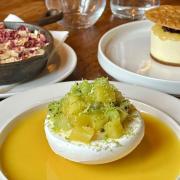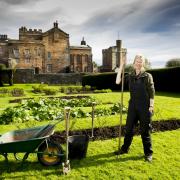Kendal Farmers’ Market sits at the heart of the town bringing shoppers in from far and wide.
It was established more than 30 years but in the past 18 months in particular has gone from strength to strength to become a must-visit destination for customers who are passionate about quality, provenance and sustainably reared, grown and sourced ingredients.
In fact it is now so popular that is increasing its regularity to twice a month from its monthly operation.
The farmers’ market committee has announced that the market will operate on the second Friday and the last Friday of every month.
Stalls include freshly harvested fruits and vegetables to artisanal cheeses, homemade preserves and honey, as well as quality meat and game, and freshly baked cakes and artisan breads.
It also provides customers with the opportunity to connect with the passionate community of farmers and makers behind the products.
The granting of a market charter in 1189 by Richard I to the then Baron of Kendal, Gilbert Fitz-Renfried, heralded the arrival of ‘Market Kendal’, and the start of the town.
The creation and development of Kendal Farmers Market, one of the oldest in the UK, has come into its own especially in the years following the pandemic with increased interest in the provenance of food.
Catherine Connor, chair of Kendal Farmers’ Market, says: “It’s really good news that we’ve been able to increase the number of Market Days from one to two each month and that’s largely down to the quality of the hugely dedicated stallholders and the amazing produce that they have on their stalls for people to buy.
“There’s no doubt at all that the Farmers’ Market adds a real focal point to Kendal’s high street. It attracts local residents and visitors into the heart of the town in equal measure, helping to drive overall footfall, dwell time and customer spend, all of which in turn helps support the town’s shops because people linger longer and make an occasion of the day.”

Operating at Kendal Farmers’ Market has allowed a number of start-up businesses to try out their idea before committing to bricks and mortar sites.
It has been a catalyst for 31 new business start-ups in the years following the pandemic and of those 60 per cent are still regular stallholders, who have loyal followings and continue to grow.
A further 20 per cent have flourished to such an extent that they have outgrown the market and chosen to take on dedicated premises locally, including The Seafood Shack, Wraysholme Creamery, Morecambe Bay Chowder, Northern Pasta and Fellside Coffee.
The market committee is now looking at how it can increase the number of available pitches for each market day.
The market has also seen a number of successful collaborations and this month My Gourmet Mushrooms and Thornby Moor Dairy join forces with Marra café, just off the Market Place at Branthwaite Brow.
The café is renowned for fresh piadina, coffee and cake and, of course, sourdough pizza, including truffled mushroom.
kendalfarmersmarket.co.uk
marra46.co.uk

MY GOURMET MUSHROOMS
Steven Gorst is originally from Liverpool but lived in Kent for 40 years. After taking early retirement from school headship in 2014, and subsequently helping to look after his elderly father back in his home city, his extended family moved to Kendal in late 2018.
“I wanted to set up and run a small business and, by chance, found online training to show how to make grow-you-own oyster mushroom kits. I rented a small business unit in October 2019, and started growing fresh mushrooms and making/selling kits,” Steven explains.
When COVID-19 hit, his kits sold well online, but the fresh mushrooms didn’t sell in great numbers, so he started using them to make a selection of products with shelf life.
“I still make kits but concentrate on value-added gourmet mushroom products that are pretty unique.”
Having spent 18 months exploring various markets and events, he has decided that farmers’ markets are his best outlet, and he has been trading on Kendal Farmers’ Market for around five years. Steven also has some wholesale customers, including Cranstons.
One of the most enjoyable parts of his job is meeting customers. “Talking to customers about what we do and why and it’s great getting positive feedback from them too, especially when they’re returning customers,” he says.

What was your first job?
I left school in 1973/4 and joined the civilian dept of Merseyside Police. After training I then secured my first teaching post in Kent in 1978.
What are the main challenges of your job?
Like almost any business it’s about securing the cash flow that you need to be able to scale up what you’re doing.
What key skills do you need to become a food producer?
A healthy dose of common sense is very useful and then outlining and setting your priorities and ultimately your business goals.
What’s the oddest thing a customer has ever said to you?
Quite frequently people ask me about fresh mushrooms, “Can you eat them?”.
What advice would you give to someone wanting to become a food producer?
Don’t overreach yourself financially or commit to too much too soon, that way you can grow steadily without any unnecessary pressure.
If you weren’t in the food industry, what would you do?
Write and record more songs/music (my hobby).
If you could meet yourself at the start of your career, what's the one piece of advice you would give yourself?
Believe in yourself: watch and listen to others, it’s a great way of learning the ropes.
If you could serve anyone, who would it be and why?
My maternal grandfather – he died before I was born, so I never met him.
What’s your earliest food memory?
Making sponge with my mum aged three or four.
Which ingredient do you love the most and why?
Extra virgin olive oil – it’s just amazing in every way.
What would you change about the industry?
For the powers that be to make more small starter kitchens/commercial spaces available to rent at affordable prices, which would inevitably encourage more business development.
What’s your favourite dish to cook at home?
Anything tempura.
What do you always carry with you?
A tune in my head.
Tell us a secret...
I was a child model for Dinky Toys/Meccano/Scalextric in the 1960s/70s.
Who would play you in a film about your life?
Toby Jones.
What’s your favourite book?
The Tao Te Ching.
If you had more time, what would you do?
Try and understand the universe – I’m sure dark matter is something simple…

THORNBY MOOR DAIRY
Thornby Moor Dairy was set up by Carolyn Fairbairn who taught herself how to make cheese using milk from her own goats in 1979. It enabled her to remain at home while raising her three children and produce wholesome food for both her family and the local community.
The dairy is located at the heart of the Solway Plain and housed within the outbuildings of the old Crofton Hall Estate, near Thursby. Milk is sourced from Parton Hall, Micklethwaite (dairy shorthorn cows) and Thorny Moor’s own Dolken dairy goats.
The dairy has been trading on Kendal Farmers’ Market on the early days and Carolyn was later joined by her daughter Leonie in the business.
Popular with some of the county’s top chefs, its best-known cheeses include Allerdale, Blue Whinnow, Crofton and Cumberland Farmhouse.
What was your first job?
Caro: At a strawberry farm in Suffolk.
Leonie: Feeding pigs – morning and evening for an orange chocolate Club biscuit.
What's your most enjoyable part of your job?
Being a part of the cheesemaking community – it is very friendly and mutually supportive.
What key skills did you need to become a (raw milk) cheesemaker?
Stubbornness. Stamina. Single-minded determination and an inability to perceive barriers.
Which industry figure do you most admire, and why?
Humphrey and Selina Errington, for their sheer selfless drive and determination to continue the use of raw milk in cheesemaking.
What’s the oddest thing a customer has ever said to you?
So very many! How about, “I don’t drink it. I sit in it.”
What advice would you give to someone wanting to become a food producer?
Spend time with other producers. Visit them, work for them. Study their premises and customer base. Look for the similarities and the differences.
If you weren’t in the food industry, what would you do?
Caro: Photographer, gardener, farmer.
Leonie: Go on an adventure.
If you could meet yourself at the start of your career, what's the one piece of advice you would give yourself?
Be wary of the cost of complying with criteria required to access grants.
If you could serve anyone, who would it be and why?
Anyone who’s willing to taste and ask probing questions.
What’s your earliest food memory?
Caro: Packing up bread and cheese to go out and help with the harvest (because that is what the farmers ate).
Leonie: Potatoes and gravy.
Which ingredient do you love the most and why?
Milk – do you need to ask why?
What would you change about the industry?
I would correct the conception that cheese is anything other than highly nutritious.
What’s your favourite dish to cook at home?
Cumberland sausage and vegetables.
Tell us a secret...
Caro: I once spent a night in prison.
Who would play you in a film about your life?
Caro: Someone very strong.
Leonie: Someone with frizzy hair.
If you had more time, what would you do?
Caro: Garden, get a dog and visit my family.
Leonie: Learn to knit well.
PHOTOGRAPHY AILISH ADAMS STYLING CATHERINE CONNOR

Marra sourdough pizza
INGREDIENTS
200g sourdough starter
630ml warm water
1kg Italian pizza flour
20g sea salt
20ml olive oil
METHOD
1 Weigh the ingredients into a mixing bowl. Mix into a rough dough.
2 Knead the dough really well until it’s smooth stretchy and soft. Then rest it back in the bowl covered for at least ten minutes – half an hour is ideal.
3 Divide the dough into five equal portions, shape them round and cover, leave to prove for at least six hours, then transfer to the fridge overnight.
4 Take the dough out of the fridge and bring to room temperature, then roll out into delicious thin pizza base.
5 Add toppings of your choice and then bake on a baking stone as hot as your oven will go.



























